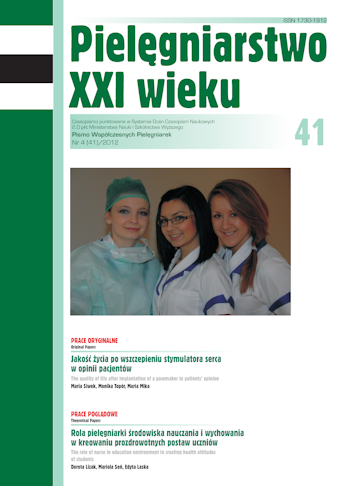Appraisal of knowledge of the pupils attending schools in Krakow about a hospice and volunteering
Keywords:
palliative and hospice work, volunteer workAbstract
APPRAISAL OF KNOWLEDGE OF THE PUPILS ATTENDING SCHOOLS IN KRAKOW ABOUT A HOSPICE AND VOLUNTEERING
Introduction. Hospice is a place where people who cannot be treated by contemporary medicine are staying. It offers different actions which are directed towards bio-psycho-social sphere as well as spiritual sphere of a patient and which aim is to improve quality of ill person’s life and also the life of his/her family. People with interdisciplinary education take care of the patients; but among professional medical staff, volunteers play very important role in hospices.
Everyone who is above 13 and is willing to devote their time, work, their skills, interest, and heart voluntarily to people who are waiting for help, and in case of hospice to people who are near death, can become a volunteer.
Aim. Learning how much the pupils attending the schools in Krakow know about a hospice and volunteering.
Material and methods. The research was carried out in a sample of a hundred pupils of the schools in Krakow. The method of diagnostic survey was used applying a 21-question questionnaire developed by the author of this thesis. Working on the outcome, Excel table was used in which “N” stands for the number of respondents and the result is shown as a percentage.
Results. More than 50% (N=50) of the respondents have neither thought nor talked about volunteering. One third of the respondents are of the opinion that the hospice care is free of charge. Sixty percent (N=60) of the respondents think that the palliative care that covers the comprehensive care of the sick people in the final days of their lives can be defined as thorough nursing care of a dying man.. Ninety-five percent (N=95) of the respondents try to be nice, smiling and compassionate when they are with the sick. According to the respondent youngsters, they have learnt about volunteering at school, while mass media has been the source of knowledge about the hospice care. Forty-eight percent (N=48) of the respondents are of the opinion that a volunteer should be physically and mentally mature to help the others.
Conclusions. Preponderance of the pupils who participated in the survey learnt about the hospice care from mass media and about volunteering at school. Most of them think that the hospice care is free of charge, and perceive the sick as lonely. Starting his/her work, a volunteer should be trained, and should be physically and mentally mature.
References
1. Skura-Adziała A. Holistyczny wymiar opieki paliatywno-hospicyjnej. [w:] Zdrowie Publiczne. 2006; 116 (2): 301-306.
2. Łuczak J. Co to jest leczenie objawowe (paliatywne), opieka paliatywna – hospicyjna i dlaczego warto z ich korzystać? [Data cytowania 15.05.2011]. http://www.ptt-terapia.pl/wp-content/uploads/2011/06/ Luczak.pdf.
3. Buczkowski K, Krajnik N, red. Opieka paliatywna. Warszawa: Wydawnictwo Lekarskie PZWL; 2009, s. 10.
4. De WaldeN-Gałuszko K. U kresu. Gdańsk: Wydawnictwo Medyczne MAKmed; 1996.
5. De Walden Gałuszko K. Podstawy opieki paliatywnej. Warszawa: PZWL; 2004, s. 11-12.
6. Definicja opieki paliatywnej, [Data cytowania 15.05. 2011].http://www.who.int/
7. Moroń D. Wolontariat w trzecim sektorze. Prawo i praktyka. Wrocław: Wydawnictwo Uniwersytetu Wrocławskiego; 2009. s. 35.
8. De Walden Gałuszko K. Podstawy opieki paliatywnej. Warszawa: PZWL ;2004, s. 12-18.
9. Krajnik M, Buczkowski K. Definicja i filozofia opieki paliatywnej. [ w: ] Opieka Paliatywna. Adamczyk A i wsp. Warszawa: Wydawnictwo Lekarskie PZWL; 2009, s. 10-11.
10. Ministerstwo Zdrowia i Opieki Społecznej. Program rozwoju i opieki paliatywnej w Polsce. Warszawa: 1998.
11. Bołoz W. Mamy prawo umierać po ludzku. [w:] Informator –umierać po ludzku. Gazeta Wyborcza. 2008; 30 października: 8-10.
12. Weber T. Oswojanie umiera. Kraków: Fall; 2009.
13. Stokłosa J. : Jak założyć hospicjum. Informator. Kraków. TPCH Hospicjum im. Św. Łazarza w Krakowie,;2005, s. 10-12.
14. Krakowiak P, Janowicz A. Historia i współczesność wolontariatu hospicyjnego. [w:] Podręcznik koordynatora wolontariatu hospicyjnego. Krakowiak P i wsp. Gdańsk: Via Medica; 2008, s. 1-24.
15. Lalak D, Pilch T, red. Elementarne pojęcia pedagogiki społecznej i pracy socjalnej. Warszawa: Wydawnictwo Akademickie Żak; 1999, s. 335.
16. ABC .... czyli przewodnik wolontariusza Towarzystwa Przyjaciół Chorych ,,Hospicjum św. Łazarza w Krakowie’’. Kraków ; 2009, s. 10-11.
17. Górecki M. Hospicjum w służbie umierającym. Warszawa: Wydawnictwo Akademickie Żak; 2000, s. 80-81.
18. Pawłowski L, Lichodziejewska-Niemierko M. Wolontariat w opiece paliatywnej i hospicyjnej w Polsce – aspekty prawne. Medycyna Paliatywna w Praktyce. 2010; 4, 3: 130-131.
19. Krakowiak P. Współpraca hospicjów z mediami masowymi w edukacji na temat końca życia. Onkologia Polska. 2005; 8(3): 125-127.
20. Hospicjum św. Łazarza w Krakowie [data cytowania 15.05.2011]. http://www.hospicjum.krakow.pl.
21. Marcin Hładuński i wsp. Postrzeganie hospicjum i opieki paliatywnej w Polsce przez studentów fizjoterapii. Probl. Hig Epidemiol. 2011; 92(2): 361-366.
22. Polacy o hospicjach i opiece paliatywnej. [Data cytowania: 15.05.2011]. http://www.cbos.pl/SPISKOM.POL/2009/K_149_09.pdf.
23. Szamborska ., Pietruk K. Człowiek hospicjum, czyli model wolontariatu w opiece paliatywnej. [w:] W drodze do brzegu życia. 2009;Tom VII.
Downloads
Published
Issue
Section
License
Copyright (c) 2012 Maria Siwek, Izabela Chmiel, Aleksandra Dumańska (Autor)

This work is licensed under a Creative Commons Attribution 4.0 International License.




